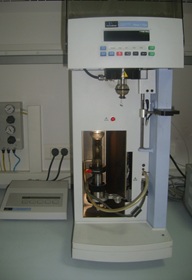Thermogravimetric Analyzer

Instrument: Perkin Elmer Pyris 1 Thermogravimetric Analyzer (TGA)
Accredited Method: EN ISO 11358-1 TS EN ISO 11358-1 Plastics - Thermogravimetric Analysis (TGA) Of Polymers
Thermogravimetry is generally used to determine the mass loss and/or gain of materials as a function of temperature or time.
The test sample is heated at a constant heating rate and the mass change is measured and recorded as a function of temperature. Alternatively, the mass change of the sample over a given time interval at an appropriate constant temperature is measured and recorded as a function of time. In general, reactions that cause the mass of the test sample to change; decomposition or oxidation reactions or evaporation of a component.
The graph of mass versus time or temperature is the TG curve. The change in mass of the material as a function of temperature and the range in which this change spreads are indicators of the thermal stability of the material. TG data can be used to evaluate the relative thermal stability of a family of polymers derived from the same monomer and to analyze polymer-polymer or polymer-additive interactions, using measurements obtained under the same experimental conditions.
Specifications
- Temperature Range: Room temperature - 950 ºC
- Resolution: 1µg
- Atmosphere: Nitrogen, Air, Oxygen
Sample Requirements
- Solid materials (preferably in powder form).
- Sample weight: Approx. 15 mg
Applications
- Mass loss in solids and solvents
- Determination of Deterioration Temperature
Laboratories
Laboratories

Instrument: Perkin Elmer Pyris 1 Thermogravimetric Analyzer (TGA)
Accredited Method: EN ISO 11358-1 TS EN ISO 11358-1 Plastics - Thermogravimetric Analysis (TGA) Of Polymers
Thermogravimetry is generally used to determine the mass loss and/or gain of materials as a function of temperature or time.
The test sample is heated at a constant heating rate and the mass change is measured and recorded as a function of temperature. Alternatively, the mass change of the sample over a given time interval at an appropriate constant temperature is measured and recorded as a function of time. In general, reactions that cause the mass of the test sample to change; decomposition or oxidation reactions or evaporation of a component.
The graph of mass versus time or temperature is the TG curve. The change in mass of the material as a function of temperature and the range in which this change spreads are indicators of the thermal stability of the material. TG data can be used to evaluate the relative thermal stability of a family of polymers derived from the same monomer and to analyze polymer-polymer or polymer-additive interactions, using measurements obtained under the same experimental conditions.
Specifications
- Temperature Range: Room temperature - 950 ºC
- Resolution: 1µg
- Atmosphere: Nitrogen, Air, Oxygen
Sample Requirements
- Solid materials (preferably in powder form).
- Sample weight: Approx. 15 mg
Applications
- Mass loss in solids and solvents
- Determination of Deterioration Temperature
